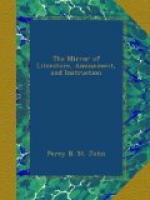“’My father dies; thenceforth
with care oppressed
New thoughts and feelings fill my harass’d
breast;
Homer gives way to lawyers and their deeds,
And all a brother’s love within
me pleads;
Fit suitors found, two sisters soon are
wed,
And to the altar without portions led.
With all the wants and wishes of their
age
My little brothers next my thoughts engage,
And in their father’s place I strive
untired
To do whate’er that father’s
love inspired.
Thus watching how their several wills
incline
In courts, in study, or in arms to shine;
No toil I shun their fair pursuits to
aid,
Still of the snares that strew their path
afraid.
Nor this alone—though press
we quick to land,
The bark’s not safe till anchor’d
on the strand.’”
Passing over the commencement of the Orlando Furioso, which soon followed the above melancholy event—“To be the freer from interruptions, and at the same time render his moderate income equal to his support, he left Ferrara, and took up his residence on an estate belonging to his kinsman Malaguzzo, between Reggio and Rubiera. He has described this retreat, and the pleasant manner in which he spent his time during his short residence there, in his fifth Satire; but it is disputed whether the account alludes to this or an earlier period of his life:
“’Time was when by sweet solitude
inclines
The storied page I fill’d with,
ready mind;
Those gentle scenes of Reggio’s
fair domain,
Our own dear nest, where peace and nature
reign;
The lovely villa and the neighbouring
Rhone,
Whose banks the Naiads haunt serene and
lone;
The lucid pool whence small fresh streams
distil
That glad the garden round and turn the
mill;
Still memory loves upon these scenes to
dwell,
Still sees the vines with fruit delicious
swell,
Luxurious meadows blooming spread around,
Low winding vales and hills with turrets
crown’d.’
“The Duke Alphonso, seeing him left without a patron, and provided with so small an income, invited him to return to Ferrara, which he did, and found no reason, it is said, to regret that he had once more put himself under the protection of the house of Este. Alphonso, knowing his love of retirement and the peculiarity of his habits, promised to leave him at perfect liberty to pursue his studies and live in the way that most suited his wishes. He kept his promise, and there is reason to believe that the presents he bestowed on the poet enabled him to build the cottage in which he resided, with few interruptions, till his death. This favourite house of Ariosto’s was situated near the church of S. Benedetto, and stood in the midst of a spacious garden which formed both his pride and delight. Here he continued to compose additional cantos to the ‘Orlando Furioso,’ and occasionally, to relax his mind with lighter species of poetry, sometimes writing a satire, and at others reverting to the comedies composed in his younger years, and which he subsequently made fit for the stage.”




